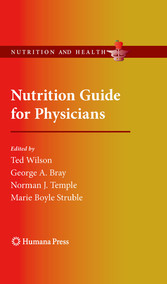Suchen und Finden
Nutrition Guide for Physicians
Nutrition Guide for Physicians is a desktop reference guide on nutrition and its clinical implications for health and disease through the lifecycle. Presented in a new softcover format and user-friendly style, it serves as a valuable resource of practical information on nutrition for physicians in their daily practice. Nutrition Guide for Physicians is divided into three parts that cross the spectrum of nutritional concerns for improving the practice of medicine. Part One provides basic nutritional principles for physicians. Part Two covers nutrition through the lifecycle and optimal nutrition patterns through all stages of development. Part Three covers diet and its role in prevention, cause and treatment of disease. All chapters include figures and tables that provide useful descriptive and visual reviews. 'Key points' and succinct 'conclusions' are also provided for each topic. Nutrition Guide for Physicians provides a wide perspective of the impact that nutrition has upon medical practice and will be am indispensable resource for primary care physicians and other medical professionals.
Dr. Ted Wilson, PhD is an associate professor of Biology at Winona State University in Winona, Minnesota. He teaches courses in Nutrition, Physiology, Cardiovascular Physiology, Cell Signal Transduction and Cell Biology. His research examines how diet affects human nutritional physiology and whether food/dietary supplement health claims can be supported by measurable physiological changes. He has studied many foods, dietary supplements and disease conditions including low-carbohydrate diets, cranberries and cranberry juice, pomegranate juice, apple juice, grape juice, wine, resveratrol, creatine phosphate, soy phytoestrogens, tomatoes, eggplants, coffee, tea, energy drinks, heart failure prognosis, diabetes and obesity. Diet induced changes have includes physiological evaluations of plasma lipid profile, antioxidants, vasodilation, nitric oxide, platelet aggregation, glycemic and insulinemic responses using in vivo and in vitro models. With Dr N. Temple he has edited Beverages in Nutrition and Health (Humana Press, 2004) and Nutritional Health: Strategies for Disease Prevention (Humana Press, 2001 1st and 2006 2nd edition).
Alle Preise verstehen sich inklusive der gesetzlichen MwSt.








